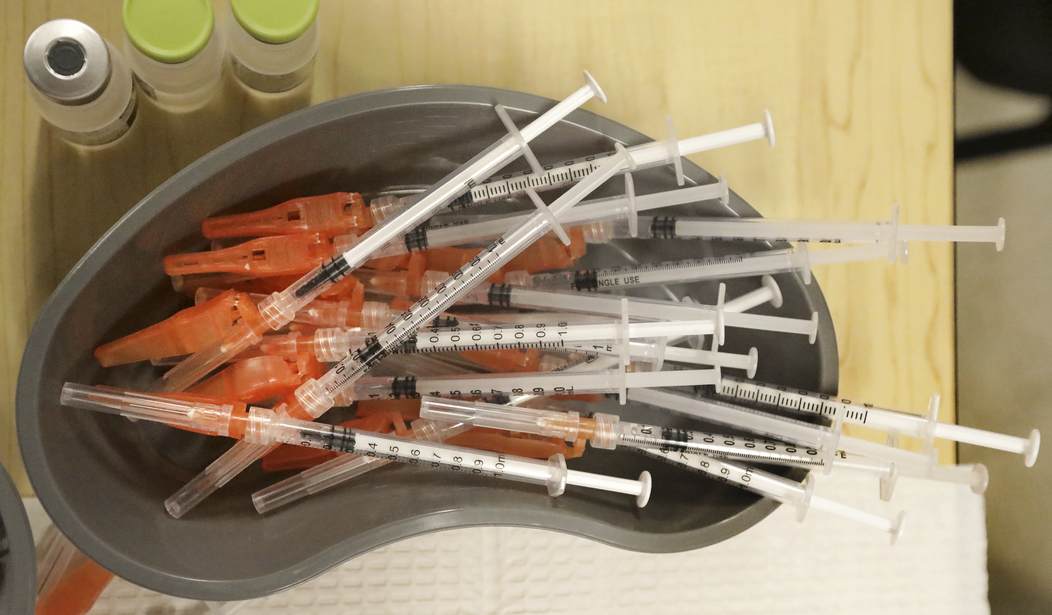Just when you thought it was safe to go back to Saxony-Anhalt — now we learn that a German man from Magdeburg, over 29 months, received no less than 217 COVID-19 vaccines and boosters — and lived. So far, he appears to have suffered no physical ill effects, but being used as a human pincushion like that has to have made him a sour Kraut.
A 62-year-old man in Germany decided to get 217 COVID-19 vaccinations over the course of 29 months —for "private reasons." But, somewhat surprisingly, he doesn't seem to have suffered any ill effects from the excessive immunization, particularly weaker immune responses, according to a newly published case study in The Lancet Infectious Diseases.
The case is just one person, of course, so the findings can't be extrapolated to the general population. But, they conflict with a widely held concern among researchers that such overexposure to vaccination could lead to weaker immune responses. Some experts have raised this concern in discussions over how frequently people should get COVID-19 booster doses.
No matter what one thinks of the COVID vaccines and their rush to use, this case raises a valid point: While this man doesn't yet seem to have suffered any ill effect from his 29-month vaccine-a-palooza, it's important not to draw any conclusions from a data set of one.
The danger of such frantic over-vaccination like this, regardless of the vaccine used, is that it can weaken the immune system overall by fatiguing the factors that provide immunity, like T-cells.
In cases of chronic exposure to a disease-causing germ, "there is an indication that certain types of immune cells, known as T-cells, then become fatigued, leading to them releasing fewer pro-inflammatory messenger substances," according to co-lead study author Kilian Schober from the Institute of Microbiology – Clinical Microbiology, Immunology and Hygiene. This, along with other effects, can lead to "immune tolerance" that leads to weaker responses that are less effective at fighting off a pathogen, Schober explained in a news release.
The German man's extreme history of hypervaccination seemed like a good case to look for evidence of such tolerance and weaker responses. Schober and his colleagues learned of the man's case through news headlines—officials had opened a fraud investigation against the man, confirming 130 vaccinations over nine months, but no criminal charges were ever filed. "We then contacted him and invited him to undergo various tests in Erlangen [a city in Bavaria]," Schober said. "He was very interested in doing so." The man then reported an additional 87 vaccinations to the researchers, which in total included eight different vaccine formulations, including updated boosters.
Regardless of the efficacy of the COVID vaccines or whether he suffered any ill effect from this, one would think that the German docs would have some serious mental health concerns with this case; this man would sure seem to be harboring a significant paranoia about the COVID virus, which our own CDC is now advising to treat like the ordinary flu — and the vaccines are still, to say the least, of questionable value.
See Related: CDC Issues New COVID Guidelines to Match Flu, Other Respiratory Illnesses
Rep. Chip Roy Introduces Bill Allowing People to Sue COVID-19 Vaccine Manufacturers If Injured
Full disclosure: When the first COVID-19 vaccines were released, I received two doses of the Moderna vaccine, as at that time, a significant part of my consulting business involved international travel and at least one country in which I did a lot of business (Japan) wouldn't let me in without it. But Japan has dropped that requirement, and (obviously) I'm in another line of work now, in any case; I have and will continue to refuse any boosters. I have no ill effects to date, having continued my lifelong record of being healthy as a horse.
There's an inevitable conclusion to draw here: This German man's case may be interesting, but as he presents a data set of one, the fact that he (yet) has suffered no ill effect from his massive over-vaccination is meaningless. What this does shine some light on is this: The constant drum-beating over the COVID scare by the media was bound to, sooner or later, produce just this kind of paranoid overreaction.
You can see the Lancet report on this case here. That study concludes:
In summary, our case report shows that SARS-CoV-2 hypervaccination did not lead to adverse events and increased the quantity of spike-specific antibodies and T cells without having a strong positive or negative effect on the intrinsic quality of adaptive immune responses. While we found no signs of SARS-CoV-2 breakthrough infections in HIM to date, it cannot be clarified whether this is causally related to the hypervaccination regimen. Importantly, we do not endorse hypervaccination as a strategy to enhance adaptive immunity.
Note the disclaimer: "It cannot be clarified whether this is causally related to the hypervaccination regimen." That's science-speak for "This is a one-off, and it's not smart to draw any conclusions whatsoever."
This seems appropriate.














Join the conversation as a VIP Member